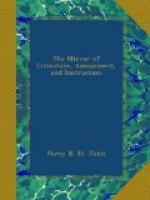or a spy, no matter how previously obscure, he sent
for him forthwith, and employed him in the way in which
he could be made most useful, and answer best the
purpose of his employer. Upon this most admirable
system (a system in which, unhappily, he has had but
few imitators among modern statesmen,) depended in
a great degree his success. His devotion has
been sneered at; but it has never been proved to have
been insincere. With how much more show of justice
may we consider it to have been founded upon a solid
and upright basis, when we recollect that his whole
outward deportment spoke its truth! Those who
decry him as a fanatic, ought to bethink themselves
that religion was the chivalry of the age in which
he lived. Had Cromwell been born a few centuries
earlier, he would have headed the crusades, with as
much bravery, and far better results than our noble-hearted,
but wrong-headed Coeur de Lion. It was no great
compliment that was passed on him by the French minister,
when he called the protector “the first captain
of the age.” His courage and conduct in
the field were undoubtedly admirable: he had
a dignity of soul which the greatest dangers and difficulties
rather animated than discouraged, and his discipline
and government of the army, in all respects, was the
wonder of the world. It was no diminution of
this part of his character, that he was wary in his
conduct, and that, after he was declared protector,
he wore a coat of mail concealed beneath his dress.
Less caution than he made use of, in the place he
held, and surrounded as he was by secret and open enemies,
would have deserved the name of negligence. As
to his political sincerity, which many think had nothing
to do with his religious opinions, he was, to the
full, as honest as the first or second Charles.
Of a truth, that same sincerity, it would appear, is
no kingly virtue! Cromwell loved justice as he
loved his own life, and wherever he was compelled
to be arbitrary, it was only where his authority was
controverted, which, as things then were, it was not
only right to establish for his own sake, but for
the peace and security of the country over whose proud
destinies he had been called to govern. “The
dignity of the crown,” to quote his own words,
“was upon the account of the nation, of which
the king was only the representative head, and therefore,
the nation being still the same, he would have the
same respect paid to his ministers as if he had been
a king.” England ought to write the name
of Cromwell in letters of gold, when she remembers
that, within a space of four or five years, he avenged
all the insults that had been lavishly flung upon
her by every country in Europe throughout a long,
disastrous, and most perplexing civil war. Gloriously
did he retrieve the credit that had been mouldering
and decaying during two weak and discreditable reigns
of nearly fifty years’ continuance—gloriously
did he establish and extend his country’s authority
and influence in remote nations—gloriously




